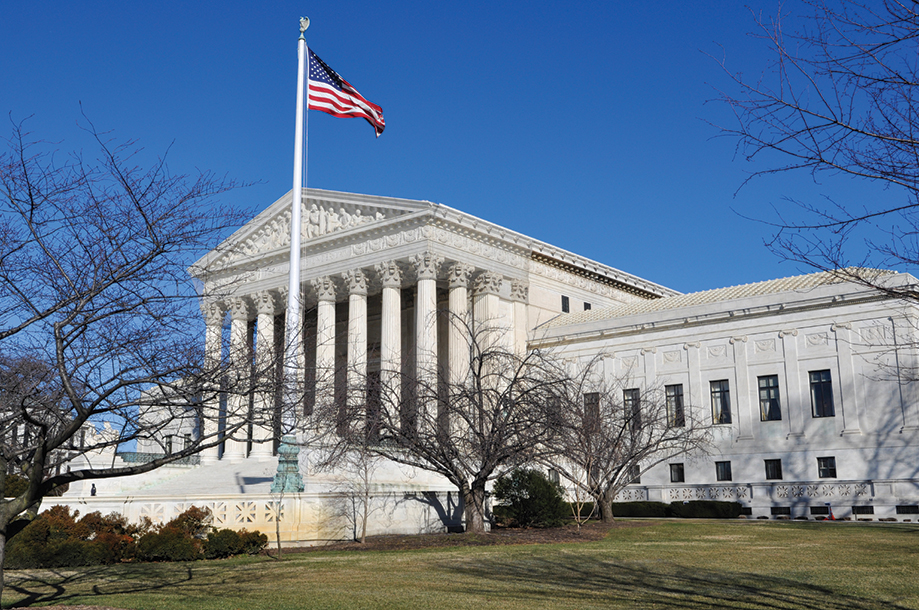
Many countries value public education systems that are free of religious influence, partly in order to accommodate religious pluralism but also to curb the manipulation of educational processes by religion. In the United States, the First Amendment prohibits government from establishing any official religion, impeding the free exercise of religion, or from privileging one view of religion over another.
Recently, a California judge rejected a claim that teaching yoga in a public school district represented a violation of the constitutional principle of separating church and state. Some parents were not convinced, however, and an appeal is underway.
The timeline here introduces a short history of some relevant legal opinions.
1961 McGowan v. Maryland
Margaret M. McGowan sues the State of Maryland because of state “closing laws,” which require most large-scale businesses to remain closed on Sundays to promote church attendance. McGowan argues that this violates the First Amendment. Supreme Court Chief Justice Earl Warren argues that even though many laws have “their genesis in religion,” repealing them would “give a constitutional interpretation of hostility to the public welfare rather than one of mere separation of church and state.” The Warren ruling establishes that at least some programs, laws, or institutions derived from religious traditions predominantly tend to promote the public good, and thus serve “a secular purpose.” Some in the contemplative education movement have relied on this case when challenged in court.
1979 Malnak v. Yogi
A federal appeals court rules that a transcendental meditation course cannot be taught in New Jersey public schools because it has a “primary effect of advancing religion and religious concepts.” The focal point of the litigation is the use of “incense, candles, the bestowing of mantras,” and a short initiation ritual conducted in Sanskrit, the primary liturgical language of Buddhism and Hinduism.
1985 Wallace v. Jaffree
The Supreme Court invalidates an Alabama statute requiring “a moment of silence at the beginning of each school day” that students and teachers can use for “prayer and meditation.” The majority opinion finds that Alabama’s legislature “enacted the statute with the specific purpose of furthering religion” because it authorized teachers who “recognize that the Lord God is one” to lead students in a prayer that acknowledged “Almighty God . . . as the Creator and Supreme Judge of the world.”
1994 Brown v. Woodland Joint Unified School District
A curricular teaching aid used in the first through sixth grades in the Woodland, California, public schools involves asking children to pretend they are witches or sorcerers, and to role-play these characters during readings of North American literature. The Brown family argue that the curriculum’s role-playing encourages children to become “practitioners of the witchcraft religion,” who are known as “sorcerers and witches,” and that “spells and charms are sacred rituals of this occult religion.” The court sides with the school district.
1996 Alvarado Et Al. v. The City Of San Jose
The city of San Jose, California, funds the construction of “the Plumed Serpent,” a sculpture representing Quetzalcoatl, of Aztec mythology. Local elementary school students participate in a ceremonial procession at the sculpture’s unveiling, accompanied by traditional Aztec dance and drum groups. In court, the plaintiffs argue that the Plumed Serpent advances religion because of its “alleged association with New Age and Mormon beliefs.” The court disagrees and rules for the City.
2001 Altman Et Al. v. Bedford Central School District
Roman Catholic families in New York accuse the Bedford schools of administering programs that promote “satanism and occultism, pagan religions, and ‘New Age spirituality’” through the use of meditation and yoga, as well as “guided-imagery, self-hypnosis, and ‘crystal-power.’” The families protest other practices, including “stress management” and “so-called ‘stress thermometers,’ relaxation, and deep-breathing.” After a five-day trial, the court finds the families’ rights under the First Amendment have been violated.
2013 | Sedlock Et Al. v. Baird Et Al.
Judge John S. Meyer decides in favor of the Encinitas School District’s yoga program. Citing Lemon v. Kurtzman (1971), a case that gauged the constitutionality of government funding for a private Catholic school, Meyer applies the “Lemon” test and finds that the yoga course “has a secular purpose,” “neither advances nor inhibits religion,” and does not represent “excessive government entanglement” with religion.

